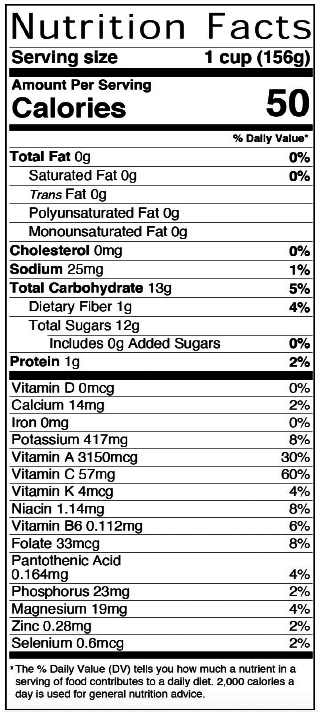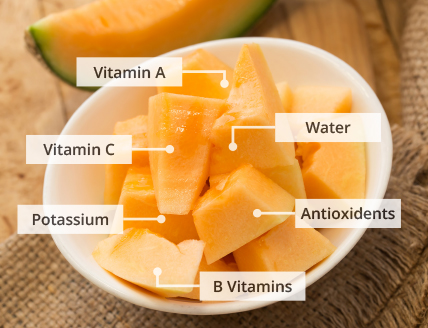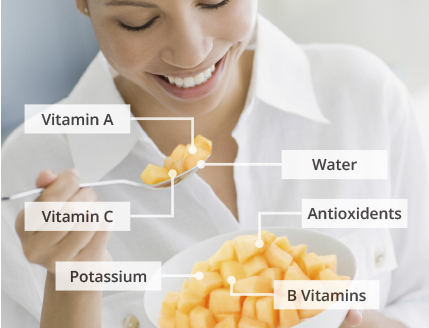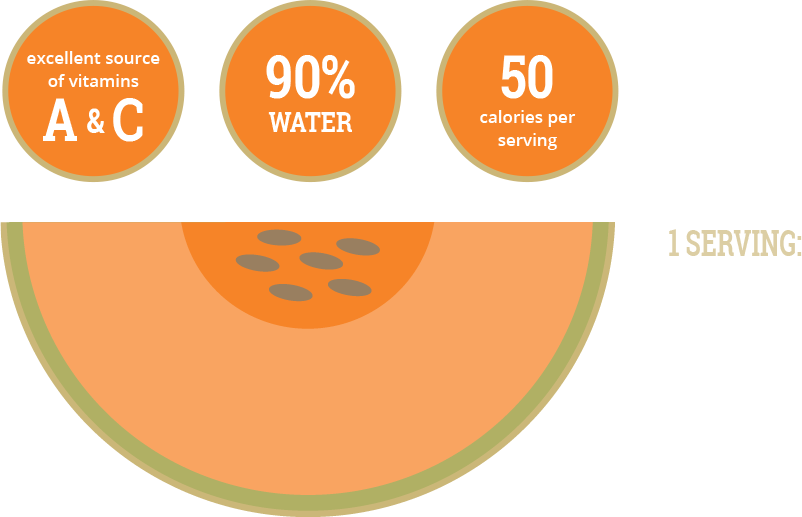SUNNY | SWEET | SAFE
WHAT?
Why?
nutrition facts
Cantaloupe isn’t just a happy option, it’s a healthy one too! A serving size of 1 cup of cantaloupe is only 50 calories yet it provides so many of the essential vitamins and minerals we need everyday to keep our bodies healthy.
Cantaloupe is an excellent source of both vitamins A and C, providing 30 percent of the daily recommended value of vitamin A and a whopping 60 percent of the daily recommended value of vitamin C. These vitamins, which act as antioxidants in the body, have been shown to decrease the risk of developing certain diseases, including heart disease and cancer.

Another benefit that comes from enjoying cantaloupe is that it contains powerful antioxidants. Antioxidants work to fight off cell damaging free radicals. Lutein and zeaxanthin are antioxidants found in cantaloupe that work together to help reduce the risk of macular degeneration and other age-related eye diseases, which can lead to blindness. Lutein also promotes brain health and may reduce cancer and heart disease risk. Cantaloupe also contains beta-cryptoxanthin. This antioxidant may lower the risk of developing some forms of cancer and degenerative diseases and help delay the onset of osteoporosis.

The B vitamins in cantaloupe help our bodies maintain healthy cells. Niacin is a B vitamin in cantaloupe that plays a key role in converting food into energy for the body. It is also required for a healthy digestive tract, skin and nervous system. Vitamin B6 plays a part in proper functioning of the body’s metabolism and immune function while the B vitamin folate helps the body produce red blood cells to prevent anemia and may protect against some types of cancer.
Both vitamin B6 and folate also play an important role in pregnancy and infant development. Folate is necessary both before and during pregnancy to decrease the risk of birth defects in the baby’s brain and spine. Vitamin B6 is important for the baby’s brain development during pregnancy and in infancy.
Cantaloupe is also one of the fruits with the highest water content. Water is essential for health and when our bodies don’t get enough of it we can become dehydrated, resulting in confusion, mood changes, overheating of the body, constipation and kidney stones. Food, especially many fruits and vegetables, supplies about 20% of the water the body requires each day. Cantaloupe is made up of 90% water, making it an excellent snack choice not just to fill you up, but to keep you hydrated.
With all these amazing healthy reasons to eat cantaloupe don’t forget the best reason to enjoy a slice — it tastes great!
EAT CANTALOUPE. BE HEALTHY.
3 SCIENCE-BASED REASONS TO EAT CANTALOUPE
Antioxidants in cantaloupe may protect against age related diseases.
• Cantaloupe is a source of lutein and zeaxanthin, both powerful antioxidants. Studies suggest lutein and zeaxanthin may protect against several age-related diseases including cataracts, macular degeneration, heart disease, stroke and several types of cancer.
Eating cantaloupe can reduce risk of cancer.
• A 1-cup serving of cantaloupe is an excellent source of both vitamin A in the form of beta-carotene and vitamin C, providing 30% of the daily recommended intake for vitamin A and 60% for vitamin C. Both of these are powerful antioxidants that research has shown are effective in reducing the risk of
developing cancer.
• A study analyzing the potential for preventing cancer in the U.S. by increasing fruit and vegetable
consumption estimated that approximately 20,000 cancer cases could be avoided each year if half the
population increased their fruit and vegetable intake by one serving per day.
Cantaloupe helps prevent heart disease
• A study investigating the effects of beta-carotene (converted to vitamin A in the body) and vitamin C
found that a diet higher in foods with these nutrients reduced inflammation and oxidative stress,
factors associated with increased atherosclerosis. Atherosclerosis, or hardening of the arteries, is the
buildup of fat and cholesterol in blood vessels that leads to heart disease.
• Another study found that a higher vitamin C intake was related to a lower incidence of heart disease.
• A third study documented that higher beta carotene was associated with lower overall incidence of
heart disease.
• An expert review of research on current intakes of fruits and vegetables and their potential health
benefits concluded that fruits and vegetables have the strongest effects in relation to prevention of
cardiovascular disease at about 5 servings a day.











